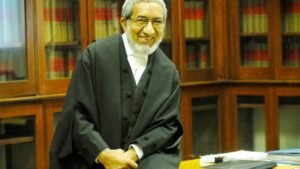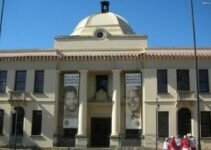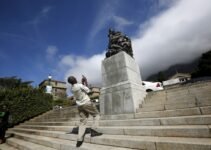This is a brief insight into South Africa’s diverse and vibrant history on February 26, a mosaic formed with strands of success, hardship, and perseverance. As we delve into the past of South Africa, we embark on a voyage through the ages, manoeuvring through the intricacies that have moulded the country we recognize today.

2017: Judge Essa Moosa passes away
Essa Moosa was a human rights lawyer from Cape Town who defended political detainees during the Apartheid regime. He was involved in establishing South Africa’s democracy and served as a judge for 13 years before retiring in February 2011. Moosa passed away on February 26, 2017, at his Rondebosch East residence after being diagnosed with cancer.
2000: Heavy rains continue to ravage SA, Botswana, Mozambique and Zimbabwe
In February 2000, Cyclone Eline hit South Africa, Zimbabwe, Botswana, and Mozambique causing heavy rains and flooding. Dozens of people died. In early 2011, South Africa experienced heavy floods again, but they were less severe than in 2000.
1996: Adriaan Vlok applies for amnesty
Former apartheid era Minister of Law and Order, Adriaan Vlok, applied to the Truth and Reconciliation Commission (TRC) for amnesty for his role in the bombing of a trade union headquarters in Johannesburg in 1987. He became the first apartheid minister to approach and express willingness to concede to political crimes his government had committed during the apartheid era. His appearance before the commission stunned many of his former colleagues. In his testimony to the TRC, Vlok stated that he received all instructions from President P.W. Botha. He was granted amnesty along with 22 former members of the security forces. Vlok recently approached the director general in the office of the presidency, the Rev Frank Chikane, knelt down and washed his feet to show his sincere wish to seek forgiveness for the past.
1996: Relations between South Africa and Algeria are smoothed out
President Nelson Mandela intervened to restore relations with Algeria. Deputy Foreign Minister Aziz Pahad was sent to Algeria to improve ties and announced that the two countries would sign a bilateral agreement. Relations had deteriorated after Mandela met with Anouar Haddam, head of the Algerian opposition Islamic Salvation Front, which caused protests from the Algerian government.
1970: The Bantu Homelands Citizenship Bill is passed
The Bantu Homelands Citizenship Bill is passed, whereby every African is issued with a certificate of citizenship of his respective ‘homeland’. The homelands in question at that time were Transkei, Ciskei, Bophuthatswana, Gazankulu, Kwazulu, Lebowa, QuaQua, Swazi Homeland and Venda. In 1974 the establishment of a tenth homeland, South Ndebele, was envisaged. Two years later (1976), the first homeland, Transkei, became “independent”. In 1975, before Transkei’s independence there was still about 1, 2 million ha due to the homelands in terms of the 1936 Act and other arrangements. After 1976 three black homelands were granted independence by the Republic of South Africa; Bophuthatswana, Venda and Ciskei.
1915: Elisabeth Eybers, South African poet, is born
Elisabeth Eybers was a South African poet born in 1915. She mainly wrote in Afrikaans but also translated her own work and others’ into English, German, French, Italian and Hebrew. Some of her collections of poetry are Confession in the Twilight (1936), The Silent Adventure (1939), The Woman and Other Poems (1945), and Collected Poems (1957). She passed away in 2007.
1910: Gandhi supports APO’s Day of Mourning
Gandhi supported the APO’s resolution to declare the Prince of Wales’ arrival in Cape Town a day of mourning. This was in protest against the South Africa Act’s disenfranchisement of Indians, Coloureds and Africans in the upcoming Union of South Africa.
1852: The Birkenhead runs aground with 638 passengers
The English troop carrier Birkenhead, under Captain Robert Salmond, stranded on a reef opposite Danger Point, southern point of Walker Bay in the Western Cape. Seven women and thirteen children were saved while the men allowed them to escape before trying to save themselves. Of the 638 passengers, 445 men perished.



